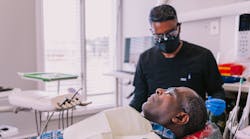Is your dental team doing everything to keep you safe? The COVID-19 pandemic brought awareness of infection prevention everywhere. Clinicians started wearing more personal protective equipment (PPE), and an uncovered cough was met with a sneer. Many patients hesitated to return to the dental office for fear it wasn’t safe to remove their masks for treatment.
Infection control is serious business in the dental space. A lot goes into keeping you, the dental team, and anyone that walks into the office safe. Every office should have an appointed infection control coordinator (ICC). This person is responsible for ensuring that all the duties are performed, supplies are on hand, and ongoing training is happening. It’s a big job with a checklist many pages long.
So how do you know if your office is doing all the things?
Here are five things to look for that will give you good insight into how seriously your office takes infection control.
Hand hygiene
The Centers for Disease Control (CDC) says hand hygiene is considered a primary measure for reducing the risk of transmitting infection among patients and health-care personnel. Hand hygiene includes the use of alcohol-based hand rubs or handwashing with soap and water.
For all routine dental examinations and nonsurgical procedures, clinicians should perform hand hygiene before putting on their gloves and after removing them. They should be rubbing their hands together for at least 15 seconds—so pay attention. Do you see them performing hand hygiene before putting on their gloves and after they take them off? Extra bonus points for an office that has patients clean their hands to reduce the spread of microbes around the office.
Open packages
As you are seated in the chair, look around. There should be very little clutter. The tray or table with the necessary supplies should be set up prior to you entering. The instruments should be wrapped in a sterile bag or wrap. This ensures that the reusable items that will be used in your mouth are, in fact, sterile and have not been cross-contaminated.
Watch for your clinician to open any packages when they’re beginning treatment. At times in my career, I’ve tried to get ahead of the clock and opened instruments ahead of time. But this creates not only an opportunity for contamination; it could also create confusion among the team, wondering if something is sterile. It’s an accident waiting to happen.
Were you offered eyewear?
Both you and your clinicians should wear protective eyewear with side shields. Your prescription glasses won’t cut it; there are countless stories about permanent damage to someone’s eye because they didn’t wear their safety glasses. Ensure that you are given eye protection, and wear it for the duration of your appointment. Many patients complain about wearing them, so many clinicians have stopped using them. But for your safety, this is nonnegotiable.
PPE at the front desk
When you arrive to check in for your appointment, are any clinical staff hanging out at the front desk wearing gowns, gloves, or even masks under their chin? PPE belongs in the back and preferably in the operatory where the clinician is working. Wandering around in PPE is an opportunity for cross-contamination. Clean PPE often looks like dirty PPE, so how can anyone know what’s clean and dirty?
Backflow
Let’s talk about the suction tip—you know, that thing that sucks the water and saliva out of your mouth. Do not close down on it. If your clinician asks you to close your mouth, gurgle back at them, “No!” Then when your mouth is clear, ask them if they use a backflow preventer. Better yet, ask before your appointment begins.
Backflow happens when the pressure in your mouth is greater than the pressure in the vacuum. So when you close down on the suction tip to clear your mouth, you are potentially ingesting fluids from the patients before you that are stuck in the line.
Bonus question: Waterlines
Ask them when their last waterline test was. The water used during your appointment comes through teeny-tiny tubing and is at risk for dangerous biofilm growth. Offices should be testing their water quarterly at a minimum to ensure it meets the standard set by the EPA for safe drinking water.
Infection control is time-consuming and expensive for dental offices. Even experienced clinicians need clarification about the hows and whats of it all. But it’s what keeps you and your dental team safe. Don’t be afraid to ask questions. Your healthy outcome could depend upon it.






